Rig Lynx founder Greg Williams sits down with Steven Toups, President and CEO of Cleargistix LLC, a company that attacks the #1 enemy of efficiency and effectiveness in the oilfield, the paper service ticket.
Click play to hear the conversation!
Greg: Tell us a bit about yourself, your background and how you managed to find yourself offering up the next solution to our ever-evolving digital world?
Steven: I'm a CPA by training, I worked for one of the national firms for a while and got hired by one of my actual clients at the time. Since I left the CPA practice, I have been a Mr. Fix It person for a wide variety of companies in a wide variety of industries but mostly concentrating on technology and technology companies. The story of Cleargistix starts when I got introduced to a group of investors in New Orleans that had bought an oil field services company in Midland Texas in 2014 and they weren't sure things were being done correctly or run correctly as well as couldn't get the information that they wanted so they hired me as the company's first CFO and my job there was to get things straightened up, get policies and procedures put into place, get someone hired and trained up and then I wouldn't have to be in Midland full-time but what I thought was going to be about a six-month process turned into a total of 4 1/2 years. Things were in a bit more of a mess than anticipated, took me a while to get things cleaned up and straightened out. During that time, I ran into the problem that oilfield service companies face in dealing with paper service tickets, paper JSAs, paper inspection forms ect. ect. everything was paper and I saw how much time, money and effort that we spent just dealing with paper and how long it was taking us to get bills and invoices out because it was on paper and at the time thought gee whiz there has to be something else out there and really couldn't find anything and that was kind of always in the back of my head as kind of a market need. After I got things cleaned up there a little bit and had somebody hired full-time, one of those investors had invested in a software company and he was considering shutting it down and he asked me to come take a look at it, which I did and I saw that there was an opportunity to possibly use the software to do digital field ticketing and I pitched that to him and said, “You know look, I think this is what you should do with it,” so he was intrigued. I wrote him a little business plan and he said, “You come run it and I will fund it,” we started Cleargistix in late 2015. We rebranded the company and what we set about to build was a very flexible, very configurable and a very easy to use, especially by the field folks, field ticketing solution. The easy-to-use part was important to me because the company I had been involved with in Midland and as I talked to the folks there, one of the things I understood we had to do is it had to be very field usable and it couldn’t be something that was forced down the throat of the field folks, it had to be something they liked and grasped.
Greg: They found what they needed was basically some of your previous skills and abilities spent with another company.
Steven: It’s a lot about problem-solving. Problem solving is using resources to overcome obstacles. Through some very hands-on interaction out in Midland where I had an apartment and would go out to location as much as I could and really understanding how things work, not just in the office but out in the field. We have hoped to translate some of these things into our solution.
Greg: Your a-ha moment was something you previously experienced in some of your other ventures.
Steve: Yes, it was about the need to get rid of paper. As a software startup, your first 5 customers are your most important because you learn a lot during these first 5. The real a-ha moment came for us after working with a service company that does work offshore. We finally got it out there and working, the feedback from the company was “This is great, we like this, it is saving us so much time”, it’s one thing for you to go and tell people that, it’s another thing for your customer to tell you that, that for us was really the first “Hey we got something here”.
Greg: Anytime you get positive feedback, it reinforces your ideas and plans especially on continuing the progress of the project, it’s very important.
Greg: People know what paperless systems are but it’s what shoe fits the foot. For the people out there that don’t know what your paperless system actually does and what it can do for them, just explain a little bit.
Steven: Sure, what we do is something pretty simple on its face, but we help companies replace paper. For oilfield companies that are using paper and or spreadsheets to document their activities in the field, we help them document the same information digitally either on a tablet, laptop or phone, then we manage the workflows around the information for reviews and approvals. Ultimately interfacing that information with the company’s billing systems, payroll systems, safety systems for JSAs etc. etc. The space in the market we are trying to own is the space between the field and the office.
Greg: Throughout your startup period and getting all this going, what kind of feedback have you gotten from your clients on what’s the best kind of device to use on a daily basis with your system?
Steven: It depends on the kind of information that the customer is capturing. Part of our implementation process is doing a deep dive into that, that will cue into us on what devices may be best. As an unpaid plug we are big fans of the Microsoft surface go tablets, very powerful, very easy to use and for a lot of the information that is being gathered we are finding that the field people do a much better job, if you got a tablet sized screen. Gathering some of the types of the information that is gathered in the oilfield on the phone is really not an efficient source of inputting information.
Greg: It's more about how data gets entered, quick note versus a jot down of something and full sentences?
Steven: You are running a frac crew or pulling unit and the types of information that you need to document doesn’t necessary lend itself to the phone.
Greg: Phone is basically only good for the wifi hotpsot
Steven: Yes, as a matter of fact when I do demos for customers, I will run the demo off my hotspot, and I will tell them, this is what you will get in the field from a performance perspective because we are running it just as you would, it runs very well off of a hotpot.
Greg: That puts things into perspective about the data alignment with the device. It’s different if you are going into the field to do a PM and adding a few notes versus recording a step by step work plan and putting details in. How they use it in the field has a big impact on the device type they would choose. I know from doing what Rig Lynx does, just making notes chasing for bugs or even working through different ideas that the screen size limits you on what your ideas are, you always want to backtrack and read through what you are doing. If you do a paragraph or two paragraphs, then you get lost in the third of forth part of that and then end up copying and pasting and sending it in an email to yourself so you can read all the way through it. Then you end up replicating the paper problem into a digital problem.
Greg: We are aware that there are a couple of competitors in the market and we know that you have done some great marketing analysis and you understand what the pain points are from your clients, tell us a few key things that make you different from some of the other products that are available?
Steven: We are definitely focused, our focus is on ensuring that we have a very flexible, very configurable and very field usable solution. Our general premise is that the solution has to be viewed by the field personnel as being better than what they have now. They have to view it as using Cleargistix is better than paper. We have spent a whole lot of time and effort on the development side of how our system is constructed to make sure it is absolutely easy to use for the field folks as possible. It’s that field focus that really sets us apart from other folks in the field. I had someone tell me about a year ago, “Steven do you know how refreshing it is having a businessperson come and sit in front of me and pitch something to me like this instead of a software person.” We have got great software, but we are businesspeople solving a business problem, we just happen to be solving it with software. We do not spend a lot of time developing cute software and flashy stuff because that is not what people want, people want something they can use. It is a balance between making it rich in terms of the information content and making it easy to use and I think one of the things that separates us is that balance we have struck with people that have seen not only our application but competitors applications comment upon this, gee whiz that doesn’t look hard to do and in fact it is not, but being easy is hard, it is hard to make complex processes appear easy and that is one of those things I think we do very well and we have been very successful head to head against competitors.
Greg: Key take away here, flexibility, client relations and overall servitude and passion to fix the problem, such great points. Just to be honest with you, we have met the same thing here with Rig Lynx, we have been pitched ideas, products and we could create those a lot quicker, a lot less time if you just told us what the idea was versus just dancing around it and flashing photos. If it’s not value added, it’s not good, that’s the way it is.
Greg: Just stepping back some, I am on the other side from an oilfield company perspective, say I have a small startup company and I have got a poorly managed document management system for JSAs, how do you guys step in and take those JSAs and turn them over to your system, kind of run me through that process.
Steven: During the sales process we actually ask the customer can you send us some example tickets and what we will do is we will configure those example tickets inside of Cleargistix, we will make the entry screens look as close as possible to those paper tickets that they have been filling out. The reason we do that is it becomes very easy for the folks in the field then to understand what information you are looking for because this is the same thing they have been looking at filling out these paper tickets, whether it is a service ticket, JSA, expense report or payroll form or an inspection form it is the same philosophy. Our system can capture anything that is currently being captured on paper or spreadsheets out in the field, we can capture it in our system. Our customers use it to capture a wide variety of information, not just billing and invoice information but workflow information. This platform, this very flexible, very configurable platform can do things a bunch of different ways and customers like that flexibility.
Greg: The idea there is to make it look, smell and feel like something they are already using so they are immediately switched on to it when the product comes to the worksite as well as cutting back on the learning curve.
Steven: One of the great comments we get from people is that it doesn’t take long to get them trained, they say “Is that it? we say “Yes that’s it”, they say “Well that’s not hard”, we say, “No its not”.
Greg: Sounds to me like you guys have the right idea and are moving in the right direction. There is thing about off the shelf or out of the box document management systems. There is a certain limit that those off the shelf products have, and we find that especially in the line of business that we do, everything seems to need some special configuration for each client, there is never that one key that fits every lock. The CEO wants to see something different here, the Director of Operations wants to see something different here, the Board of Directors wants to see something different here so there always seems to be this to and fro that you come to with these software platforms and that is where the cost impact comes from the services perspective. Like what is this add on going to cost me or what is this module going to cost me, what is the licensing going to cost me. You will find a lot of times that from the drilling contractors side that it is not the licenses that eat you up, it’s the added development and time spent in the back end, it is not as flexible as you say so having a product that is flexible is very important and really a key point in the market today.
Steven: When we do implementations there is no development required, as a matter of fact a big part of our sales process is a process we call doing a configured demo where we get those ticket examples from our perspective customers and we will actually do a mock configuration in our system and we will show them how their flow would look inside of our system. These are not efforts that you need to be a developer to do, this is stuff that I do, it’s not difficult to do, it’s not difficult to learn how to do but it says something about how easy our system is to utilize, that process is not only a sales process but it takes me an hour, I can get a configured demo up and ready to go in less than an hour.
Greg: From just your explanation right there, it normally takes two to three days to get started with other platforms
Steven: No, it doesn’t take long, we made a development decision very early on in our companies history that we wanted all of the tools that someone could use to do implementation and configuration of the system, we wanted all of this to be customer facing so every single thing, even tools our professional services group uses during our implementation, they are using tools that can be available to users.
Greg: Speaking on the data storage perspective, when they guys are using it in the field, say there is limited internet available or some kind of data connection, does your platform have a feature that kind of stores that data and they can go back and upload it when they are done?
Steven: Yes, we have what we call our disconnected mode, which means that it is the full functionality of the system but it is being stored up and as soon as you get to an internet connection it will sync up with our cloud infrastructure and then it will be available to everyone on our cloud.
Greg: Perfect, this is always one of these points offshore where the data is either limited or reduced capability especially when the client is using a lot of data and streaming information real time, rig site applications are sometimes reduced to minimum capabilities. They have also much the same as what you are describing as sort of an offline mode or disconnect mode, but it is basically one upload every 24 hours back to shore to refresh the database. You can work locally with your machine but every 24 hours it will load up to the cloud.
Steven: Our application has a very small data footprint, a funny story, I mentioned the a-ha moment we had with one of our first customers that has technicians offshore and that was their number one concern about getting internet access on the platforms, so their technicians just figured out a way to do it. I would like to take credit for it, but they just figured out a way. But say on a jackup they can use the offline mode but for the most part they can find a way to get internet access enough to run the system.
Greg: It comes to a point where it is all about the person that you know that is providing the vsat information, who is online in Singapore or who is online in the US, the important part is that you have the flexibility to be able to store that data and basically upload it automatically when you are back to a connection.
Steven: The other benefit is a lot of people are concerned about getting tickets approved, once you can show the company man, hey I am not going to give you a piece of paper anymore, but if you have to absolutely have to stamp something and fill out your stamp, you can do that but you can do all of those functions in Cleargistix I don’t have to give you the piece of paper, I can just send a PDF to your email so when you are going back onshore you are not carting this big thick stack of papers you have to figure out, everything is in electronic, everything is digital, everything is in your email and it’s a lot easier to manage the information. We have had some very interesting stories, one of the company men went back and showed the president of the company, “Hey look at this ticketing solution that one of our service companies are using”, the president said, “I want that used on all of our rigs”, because it’s a lot easier.
Greg: You have a 24-hour administrator in your pocket taking care of your business
Greg: From another user perspective, can smaller to larger companies use it for a human resource management tool, is it configurable for different parts of the market or is it for anything that is being used on paper?
Steven: In the interest of full disclosure we are not a HR system, however we can store for individuals, for pieces of equipment various information about them, certifications etc. We know which one of your employees are approved to work on Shell platforms or specific Shell platforms as an example. All of that information can be stored inside of Cleargistix and not only can we store the information but one of the other things that you can do inside of Cleargistix, you can attach documents and images to pieces of information inside of Cleargistix, say for example if you wanted to attach a scanned copy of your TWIC card, again that person will always have an available scanned copy of that card with them. So if it needs to be sent to someone or if they are sitting at a gate somewhere and they don’t have a copy of it, ok we can email it to you directly out of Cleargistix.
Greg: As your using the system there is the functionality within it to take a photo and attach it to any documentation they are using.
Steven: The largest use of that so far is with companies that want to document the condition of the well pad when they left, they are finishing up work and the companies tell the guys to take the tablet and take a picture of the well location and it automatically gets attached to the service ticket so now they have a firm detailed record of exactly what it looked like when they left so a month later when they get a call asking if their guy banged into the pump jack or damaged the water tank, they can go back and say no, here is the way it looked when we left location.
Greg: Whenever it is loaded from a device natively, it stores all the metadata in the background as well, basically locks everything into a full historical photo of the location at that time.
Greg: There is always going to be those customers that don’t see the need for what your system provides, how do you address those guys that don’t want to leave the old paper system or that’s the way have always done it kind of mentality?
Steve: As I mentioned before we have developed our solution around the concept that the user has to feel that this is a better way, that this is better than the paper and what we ask people is, give us a try, give us a try to show you how this is better than paper. We have a couple of stories, we were doing training with a group of people in Houston and about halfway through the class, one of their senior people all of the sudden raises his hand and said “Hold on, if I use your system I don’t have to bring my tickets to the yard every day”, it was like bingo, hell I should have been paying attention. He went on to say that this system was going to save him 30 mins to 1 hour every day and then that was another call or another location that he was going to be able to visit during the day.
Greg: Not to mention the amount of overhead with vehicle expense etc. it’s basically limitless what you would end up saving especially if you multiplied that to your headcount.
Steven: Having lived in that world for a whole, I understand how things get done in the oilfield and I will tell the pushers, look if you want to buy your company man lunch every Wed to take out there and get your tickets signed, then knock yourself out I am not going to tell you not to do that but bring your tablet with you and sign it there, again very easy to use.
Greg: As we come to know each over the last couple of weeks, we understand that you have done quite a bit of work with Bureau Veritas over the last few months, can you share some of the accomplishments with that client?
Steven: Sure, we just published a case study that we did in conjunction with Bureau Veritas, their oil and gas measurements division was facing some things that they knew they needed to overcome. There were great delays in their information process, and everything was manual, they had boxes and boxes of paper in every office. You would walk into one of their yards and you would find just stacks and stacks of paper out there. They were looking to digitize their process, very important in their evaluation of potential systems, it was something that the field technicians had to use in the field. They wound up reviewing multiple systems, some of which were being used by other divisions at Bureau Veritas and some of which were competitors of ours. What they really liked about our solutions was the flexibility, configurability and field usability. We started our implementation in October 2019 and the system was fully implemented by January 2020 which is outstanding. They have seen significant improvements in the timeliness of the information, as soon as it is captured in the field, everyone else in the company can see it. They have reduced their staff processing invoices from 6 people to 3, the other 3 people have been tasked to be data analysts instead of people key punching pieces of paper. They are already seeing a lot of value coming from examining the information from the field which again is now digital instead of spending 8 hours a day key punching information. They are getting their invoices out quickly, their ability to run their KPIs has increased dramatically, they do a lot of compensation things relating to their KPIs so having some additional clarity on this is very important to them. They are processing a couple of hundred tickets a week through our solution and one of the other interesting things that happened with them is that we got a text message from one of the contacts there that said “We are at a stay at home order for the corona virus and now I can actually work at home because my job is not consumed with being where the paper tickets are because we don’t have the paper tickets anymore, we have the Cleargistix digital tickets so all I have to do is get online and I can see all the tickets that the folks are filling out every day in the field, I can do my job from my house”, whereas before the implementation of Cleargistix this person would have been in the office where the physical paper tickets were to do her job. It has been a great experience with them, they have great project leadership, great buy in from the technicians, yard personnel and the executives like it. We are pretty proud of the accomplishments of our team related to our Bureau Veritas implementation.
Greg: Like we said before when you get that user buy in and that feedback that comes back is so important especially when you are talking about continuation and molding the system for the user. Again, that brings your flexibility, servitude the dedication and everything that you just said from Bureau Veritas explains why it is so important to have that close relationship in the digital market.
Steven: Theirs is another great example about our overall implementation philosophy is the process, we don’t say okay hey we’ve done it, here it is, go and use it, it’s a process and it’s a learning process and how we do our implementation, we do it in a very stepped and staged manner and we learn all the time. We come up with the configuration and then we validate with the people in the office, then we validate it with an initial group of field users and then we validate it with a larger group of field users and all along we can make adjustments to the configuration both from the information gathering perspectives and from the work flow perspective and again those adjustments just take a minute, it’s not like we went and printed 50,000 tickets, some ask “Hey I like for this to be here”, or “Can we rearrange this?”, and we are like yeah, how does this look and they are like yes that looks much better. By the time we are getting into the roll out with the customer we are pretty darn sure this is going to work for the company, not only the folks in the field but for the folks in the office.
Greg: Such a great story
Greg: We are getting to the end here, is there anything else that you would like to share about Cleargistix? Any other solution in the market that you are currently working towards or any other ideas that you may have on the horizon?
Steven: The majority of our customers are oilfield service companies, until about 6 months ago we really didn’t talk to any of the operators. I started getting calls from some of the operators and the calls all revolved around a pretty simple question that all of these people were trying to answer, and that question was, “What did we spend in the field yesterday?”. What they were realizing was that the answer to that question is currently sitting on a piece of paper that is sitting on the seat of the pushers truck being driven around the field and it was one large operator that we talked to said they did a study and it was 31 days from when the service was provided on average, to when they could actually see the information inside of their system. From the oilfield services company perspective then they take another 60-90 days to pay the invoice, we have all this float on the receivables but what these operators are coming to the realization of is that the value of the information to us is more important than the value of the float on the receivables, in other words the value of us not paying someone for 90 to 120 days. It’s more important for them to be able to manage their businesses to know what happened yesterday, to know what they spent yesterday, very important. The reason they are calling us is they are saying look, we also understand we can’t get that information unless individuals from our service companies in the field are capturing the information digitally. They find us by looking out in the marketplace and asking “Who is doing that?”. We have got a number of very interesting conversations with operators about fundamentally changing how payments are processed in the oilfield. That for us is a very exciting set of circumstances. The other thing that we think gives us an edge there, to get that working is going to require some collaboration between the operators and the service companies. Collaboration best happens when both parties benefit, from using Cleargistix there are definitely benefits for the operators and there are definitely benefits for the service companies, the coming together of those two groups can really fundamentally change things.
Greg: I 100% agree with that, the easier that you understand the other guy’s process and how you fit into that process is fundamental on how you move forward especially progressing from day to day, when we start talking about what we spent yesterday in the field, as the rates changes dramatically that cash flow with short term contracts is so important when you have to give someone an update that is just walking into a meeting, you have to have that real time and you have to have that information with you. Between day 30 and day 31 that could mean a huge margin change so knowing that one single day is very important, and I fully agree with that process. It’s not every day you work with a market that is so volatile as the one that we work in and once you learn that you are only a tiny piece to that but the tools that you use are able to expand on the visibility of what your work is and how important that your job that you are doing, then the easier it is to keep a job in the future, once you get in there and learn how to use it and display all that properly is very important. Personally, from my perspective, I feel that the digital future is where everyone is heading, the seamless interactions. We saw that you have partnered with DataGumbo as well for some of the blockchain technology, we are also very interested in that technology and being able to do hand off transactions seamlessly from company to company is something that you guys are starting to capitalize on, we see that as another stepping stone for the market in the future.
Steven: A lot of the fun part of my job is talking to these more forward-thinking players in the oilfield and not only just talking but saying we can put in place a system that does this which can fundamentally change processes for the betterment of the industry. That’s the fun part of my job when I get to engage with partners and customers and prospects throughout the marketplace about those things.
Greg: We feel exactly the same way, even in the world that we live in, the networking space, how do you connect this individual that is in this market, or in this field with this individual that is over here, how do you align the algorithm to bring a different crowd of people into their spectrum, yes, it is definitely interesting how much this industry in particular has changed over the last 5 years, progressively the last 3 years it has exploded. The lesser margin you start working with, the more you look to speed up transactions, the more you look to save time and things are getting quicker and faster by the day, I think that is amazing.
Steven: One of the effects of these troubled times that we are going through inside and outside the oilfield that we believe we are going to see when things begin to get better is a focus on information and fast information and digital information and decision making, it’s just not information, its intelligence for your business and the need for that is greater when oil is 20 dollars than when oil is 70 dollars, just means you have to put a finer point on the pencil. Having real time up to date acceptable information is definitely key to survival of a great number of players in the oilfield.
Greg: It has been an absolute wonderful chat with you Steven, do you want to let our readers and listeners know where they can find your product or how to contact you?
Steven: Cleargistix.com and LinkedIn.com at Steven Toups, pretty easy to find and pretty active and our email address is steven.toups@cleargistix.com .
Greg: Steven, thank you for your time today and have a wonderful day, stay safe and healthy.
The Company’s Digital Field Ticketing Solution allows oilfield companies to digitally capture a wide variety of information in the field and to digitally route that information through any type of workflow, saving costs, shortening cash cycles, improving efficiencies and providing real-time business intelligence.
Greg Williams is currently a Rig Manager, an Author and recently the Founder of Rig Lynx, an oil and gas social network where he works with bridging communication gaps and connecting people of the same craft every day to give them the power of each other and not just relying on themselves going into the future, as a team stronger.
You can contact Greg for any other information about this article or just to have a chat by downloading Rig Lynx on your iOS or Android device and connecting with him today!
Check out our other current stories!
Join the largest oil and gas community on iOS and Android!
Download the app here!
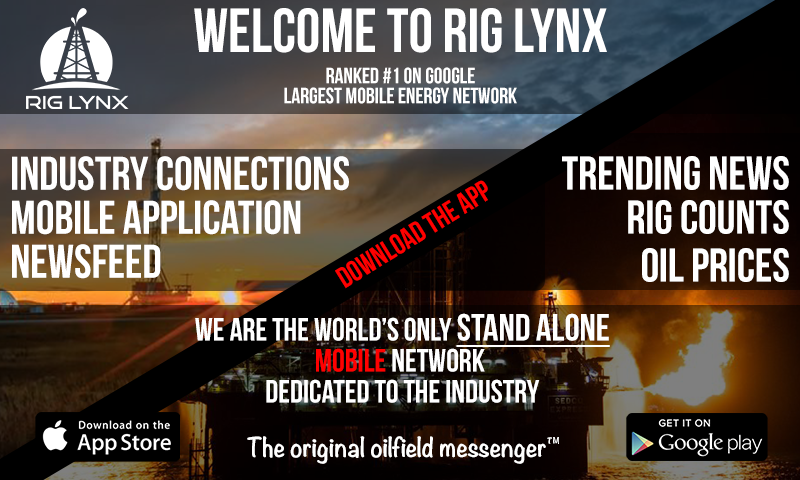



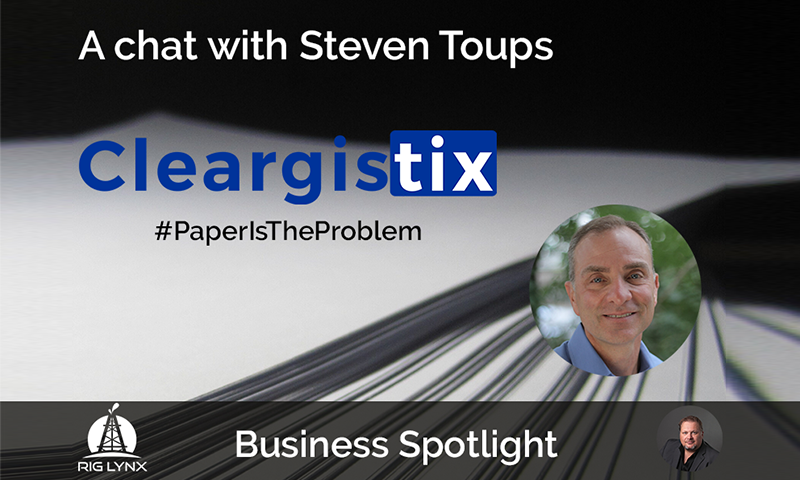
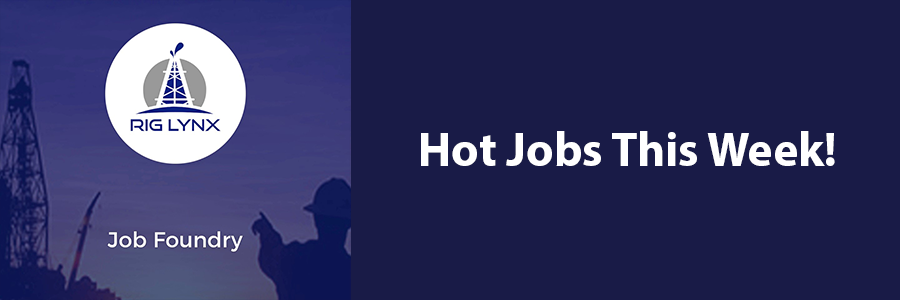

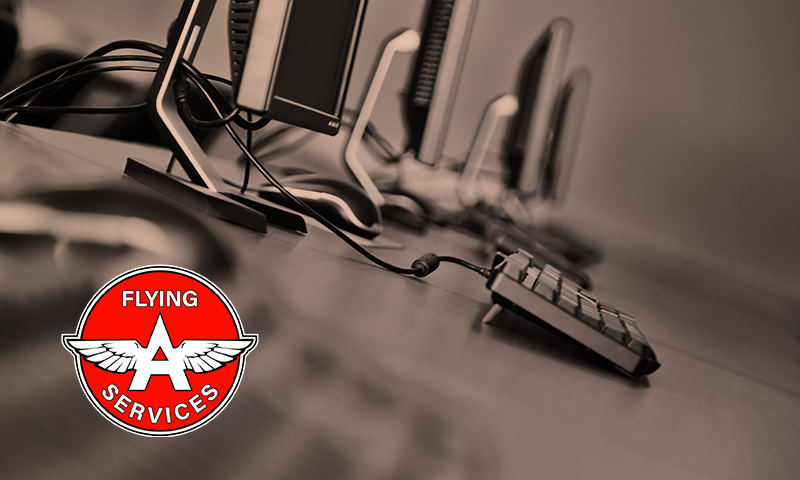
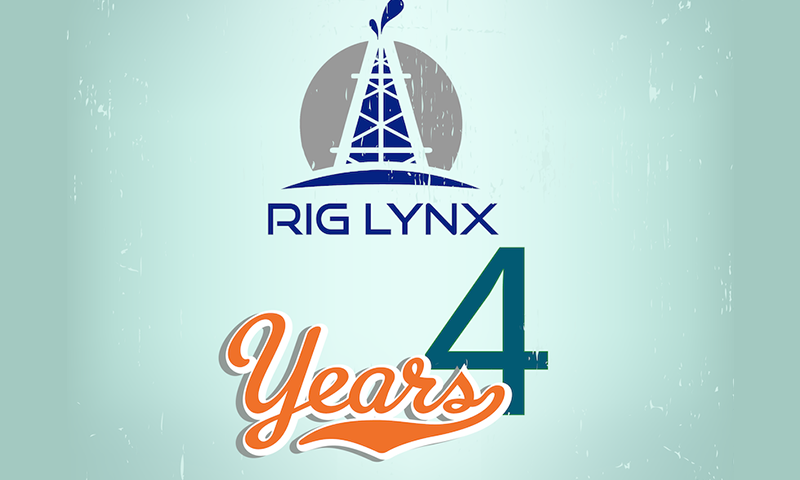
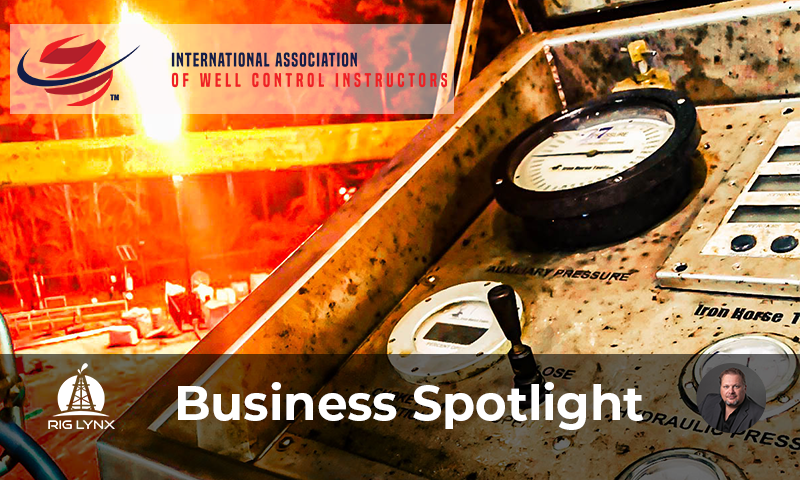


Comments (0)